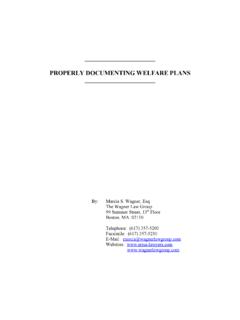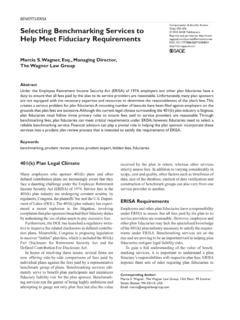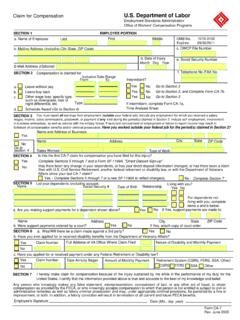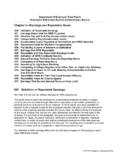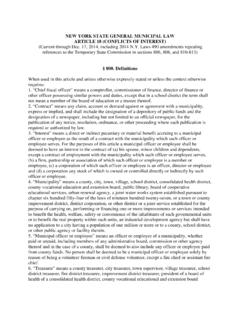Transcription of TAXATION OF DEFERRED COMPENSATION: …
1 TAXATION OF DEFERRED compensation : overview OF 409A AND 457. MCLE's Executive compensation Law by: Marcia S. Wagner, Esq. The Wagner Law Group A Professional Corporation 99 Summer Street, 13th Floor Boston, MA 02110. Tel: (617) 357-5200. Fax: (617) 357-5250. section 2. TAXATION OF DEFERRED compensation : overview OF 409A AND 457. Marcia S. Wagner, Esq. The Wagner Law Group, Boston I. SCOPE NOTE. This article provides an overview of the treatment of nonqualified DEFERRED compensation under Sections 409A and 457 of the Internal Revenue Coe of 1986, as amended (the Code ). Part II. provides background information about nonqualified DEFERRED compensation plans generally and the enactment of Code section 409A. The related interpretive guidance issued by the Internal Revenue Service is described in Part III.
2 The general requirements under section 409A for nonqualified DEFERRED compensation plans are discussed in Part IV, and the various types of arrangements which are excluded from coverage by these rules are described in Part V. Parts VI through and VIII provide an overview of Code section 457, and its application to 457(f) plans and 457(b) plans maintained by governmental employers and tax-exempt organizations. II. BACKGROUND FOR CODE section 409A. A. Qualified Plans v. 409A Plans A Code section 409A plan includes any arrangement that enables an employee to defer receiving compensation to be earned until a subsequent year and thus delay TAXATION on the DEFERRED compensation . Although section 409A covers a broad array of arrangements, it does not apply to tax-qualified retirement plans ( , 401(k) plans), 403(b) plans, 457(b).
3 Plans, or similar tax-favored plans, even though these plans also delay TAXATION on the compensation DEFERRED thereunder. The key differences between tax-favored plans and typical 409A plans include: The Wagner Law Group Specializing in ERISA, Employee Benefits and Employment Law Tax-Favored Plans 409A Plans Qualification rules prohibit Nondiscrimination discrimination in favor of the rules and most other highly compensated and limits do not apply. impose contribution and benefit limits. ERISA minimum standards ERISA minimum apply to eligibility, standards do not apply. participation, vesting, funding, etc. Plans must be funded Plan must be (except non-governmental unfunded. 457(b) plans). Employee's DEFERRED Employee's DEFERRED compensation is not taxed compensation is not taxed until payment.
4 Until payment or constructive receipt. 1. B. Pre- section 409A Plan Design Practices Before section 409A was enacted, tax practitioners had developed several techniques to soften the harder edges of the DEFERRED compensation TAXATION rules. After their initial compensation deferral elections, employees could subsequently delay TAXATION again by making a subsequent payment deferral election before their DEFERRED compensation was otherwise payable. Employees could easily accelerate receiving their DEFERRED compensation without concerns about constructive receipt, if the nonqualified DEFERRED compensation plan imposed a haircut ( , the employee forfeited a small 1. Constructive receipt means that IRS treats an employee as receiving compensation when the employee has the right to currently access the compensation , even if the employee has not exercised the right to actually receive the compensation .)
5 2. The Wagner Law Group Specializing in ERISA, Employee Benefits and Employment Law portion of the DEFERRED compensation upon accessing it). Employees with unfunded DEFERRED compensation could reduce the risk of losing their DEFERRED compensation upon their employer's bankruptcy if the plan included financial triggers that caused the DEFERRED compensation to be paid as the employer approached bankruptcy. C. Key Concepts in section 409A Rules The American Jobs Protection Act of 2004 added section 409A to the Code to regulate compensation deferral and payment elections. The new section 409A rules essentially bar employees from accelerating the payment of DEFERRED compensation . They also restrict the timing of initial compensation deferral elections and subsequent payment deferral elections.
6 The penalties for not complying with these rules are severe. Noncompliance will cause an employee's DEFERRED compensation (and related investment earnings) to become taxable and subject to a 20% additional tax penalty with a possible assessment of interest. GUIDANCE UNDER CODE section 409A. A. Notice 2007-78. On September 10, 2007, the IRS issued Notice 2007-78 to extend until the end of 2008 the deadline to make certain amendments to nonqualified DEFERRED compensation plans in order to bring them into compliance with Code section 409A. However, the extension was subject to two major limitations. First, 409A plans must have been amended before the end of 2007 if they did not include at least one time and form of payment provision that complies with section 409A.
7 Second, in a departure from its previous practice when extending the documentary deadline, IRS did not extend the current good- faith reliance period or transition rules. B. Notice 2007-86. 3. The Wagner Law Group Specializing in ERISA, Employee Benefits and Employment Law On October 22, 2007, the IRS issued Notice 2007-86. substantially revoking the transition period guidance provided in Notice 2007-78. In the Notice the IRS removed the requirement that plans be amended before December 31, 2007. if they did not include at least one time and form of payment provision that complies with section 409A and generally extended through December 31, 2008 the good faith compliance rules in effect before the IRS issued Notice 2007- 78. C. Effective Date Beginning January 1, 2009, plans must be operated in accordance with the final regulations.
8 Plans must operate in good faith compliance with section 409A and interim guidance from January 1, 2005, through December 31, 2008. During this period a 409A plan may rely on applicable IRS. guidance, but reliance on the proposed 409A regulations is not permitted after December 31, 2007. D. 2008 Plan Amendment Deadline Plan documents must be amended to comply with section 409A on or before December 31, 2008. Written plan documents, at a minimum, must include: Conditions for initial compensation deferral elections, Amounts being DEFERRED (or the formula for determining amounts DEFERRED ), The time and form of payment (including a six-month delay for payments to key employees of public companies upon employment termination), and Conditions for subsequent payment deferral elections.
9 The minimum content need not be included in one document. For example, compensation deferral election and payment deferral election forms may be separate from the plan design document. 4. The Wagner Law Group Specializing in ERISA, Employee Benefits and Employment Law E. Transition Payment Elections A 409A plan may allow employees to revise elections as to the time or form of payment of previously DEFERRED compensation , if the revised elections: are made no later than December 31, 2008, and do not accelerate DEFERRED compensation payments into 2008 or defer payments otherwise due in 2008 until later years. Similar rules apply for time and form of payment elections made in 2007. Employees who fail to change their time and form of payment elections in 2008 will generally be able to do so in 2009 or later only if they comply with the re-deferral rules in the final regulations.
10 An employer need not amend its plan retroactively to reflect actions taken during the transition period ( , January 1, 2005 to December 31, 2008), or amend or adopt a written plan document with regard to DEFERRED compensation already paid. F. Grandfathered Plans compensation earned and vested under a nonqualified DEFERRED compensation plan in effect on October 3, 2004, need not comply with section 409A. However, if these grandfathered plans are materially modified after October 3, 2004, they become subject to section 409A. G. Voluntary Correction Program In Notice 2007-78, the IRS announced its intention to establish a voluntary compliance program that will enable employers to correct unintentional failures to comply with section 409A in operation.

